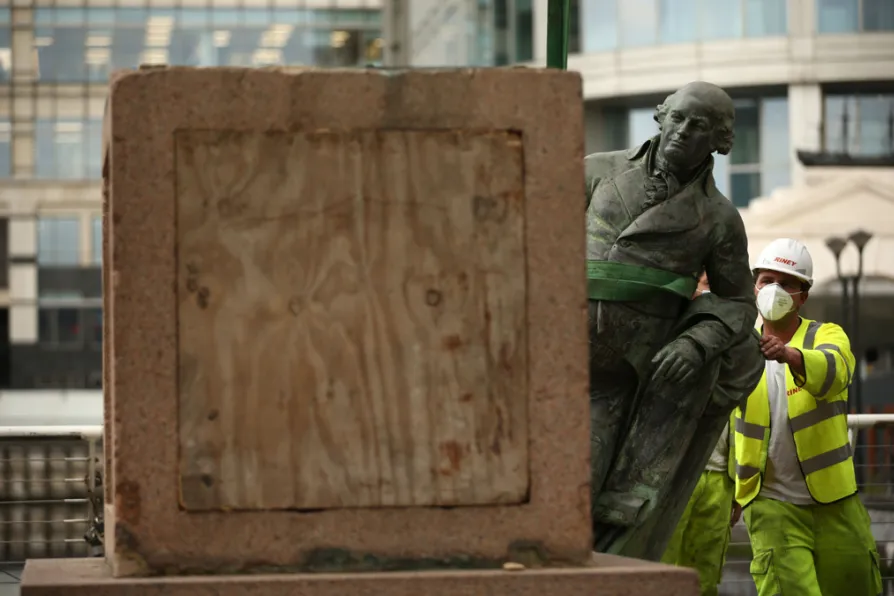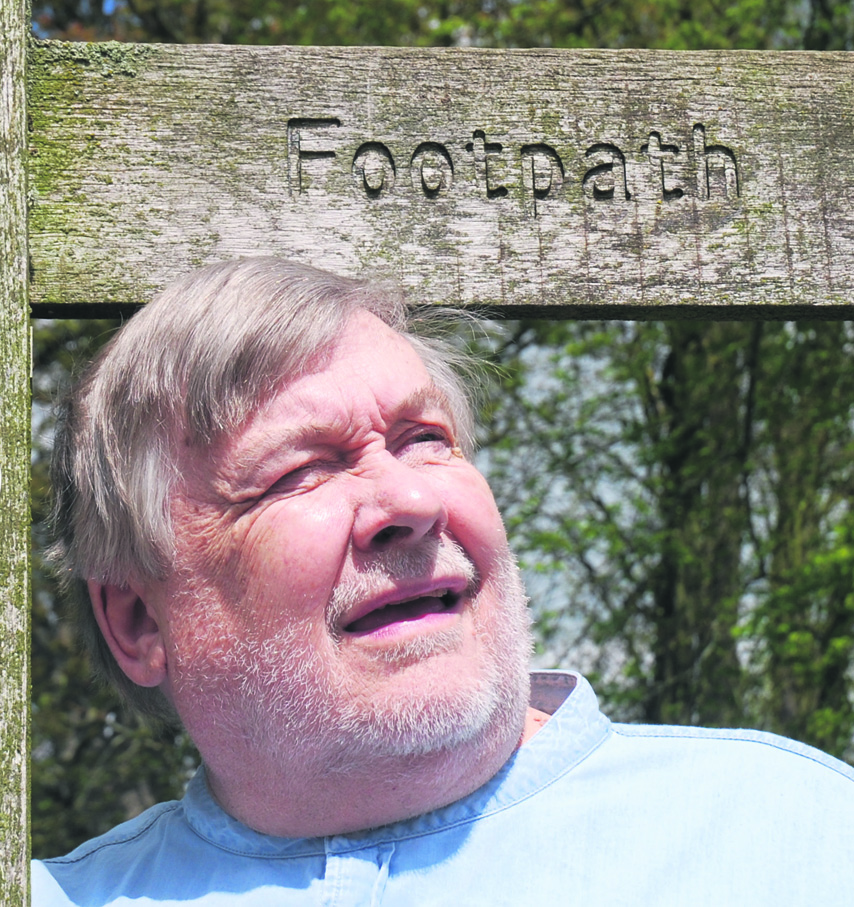VINCE MILLS cautions over the perils and pitfalls of ‘a new left party’

 Robert Milligan’s statue at West India Docks in London is taken away
Robert Milligan’s statue at West India Docks in London is taken away
LABOUR prime minister Harold Wilson once famously said that a week is a long time in politics.
He was right about this one. We have seen not just attitudes but whole agendas change as the Black Lives Matter movement gathers support.
Demonstrations all across Britain and the globe are changing the way many — but not yet all — institutions are reassessing long-term attitudes to racism.
Meanwhile – also last week – Prime Minister Boris Johnson, Home Secretary Priti Patel and other Tory bigwigs were busy attacking the direct action of those who threw Edward Colston in the drink.
Johnson called anti-racists “thugs” — a bit rich from a member of the Bullingdon Club, I thought.
The better way, the Tory government way, he and his fellow ministers told us, would be to leave the statues in place and educate people about slavery and the role of black people in history.
What a splendid idea and who better to carry it out than Tory Cabinet Secretary and ex-education minister Michael Gove.
The same Gove who just a few years ago was doing his best to totally erase black ex-slave and abolitionist Olaudah Equiano and Jamaican pioneer Crimean war nurse Mary Seacole from the national curriculum. Perhaps not.
Gladstone
Great to hear that the University of Liverpool has agreed to rename a building named after Liberal and pro-slavery prime minister William Gladstone after demands from students.
The university said: “We share in the shame that our city feels because its prosperity was significantly based upon a slave economy … we will work with the Guild of Students and with staff and student groups to agree an appropriate alternative name for the hall.”
Gladstone was ultra-conservative and a fierce opponent of abolition in Parliament.
His maiden speech was in defence of slavery. His family were one of the largest slave owners in the West Indies and when, despite his best efforts, slavery was abolished in 1834, he helped his family obtain official government compensation worth £9.5 million in today’s terms, as compensation for the slaves they were forced to free.
Hundreds of places in Britain bear the Gladstone name — but not for long.
Come on Brent Council, get rid of Gladstone Park.
Rhodes
Oriel College, Oxford, must remove the statue of Cecil Rhodes, the man who literally stole much of Africa from the Africans.
The money he left for his Rhodes scholarships still contributes to some good works. Let’s just rename them “Paying back the money Rhodes stole scholarships.” Job done.
Peel
Sir Robert Peel, who campaigned against the abolition of the slave trade and founded London’s Metropolitan Police, has statues in numerous cities including Glasgow, London, Leeds and Manchester. Move along please, nothing to see here.
Leopold II
Belgium is being forced to confront the bloody imperialist legacy of King Leopold II.
Protesters have called for all statues of the mass-murderer, who killed more than 10 million Africans, to be torn down. The first, in Antwerp, has been removed.
Baden-Powell
Back in England a statue on Poole Quay of Baden-Powell best known as the founder of the Boy Scouts has been removed.
It is now well known that Baden-Powell was a paedophile. He was also a racist. He became a national hero after the siege of Mafeking during the Boer war.
Faced with food shortages, he simply stole the Africans’ food for the whites.
He forced Africans out to steal Boer cattle or be flogged. The Boers murdered them all.
Unmoved, Baden-Powell then evicted several hundred African women from Mafeking. Most were murdered or raped by the Boers. Later Baden-Powell praised Adolf Hitler.
Confederate soldiers
After the US civil war many Confederate towns wanted a statue of a soldier who had bravely defended slavery and the South.
A foundry in the North sold hundreds and many still stand today. The foundry also sold identical cast soldiers to Union towns in the North to commemorate anti-slavery soldiers.
Churchill
Tories might call those who daubed the Churchill statue all kinds of names. Vandalise a statue? Who would do a thing like that?
Well, Morning Star cartoonist Martin Rowson was kind enough to remind us on Twitter that a drunk Winston Churchill himself vandalised a statue of Charles I on Mafeking Night many years ago — what a thug.
Robert Milligan
Glad to see the statue of Robert Milligan has been hurriedly taken down from its site outside the London Canal Museum.
Milligan used profits from the slave trade to build London’s West India Dock complex.
The Canal and River Trust was keen to have him moved into storage before he became a hazard to navigation in the canal.
Henry Dundas
Scotland has more than its share of racists on plinths. Biggest is probably the huge column in St Andrew’s Square, Edinburgh.
Atop is Henry Dundas. The City of Edinburgh is proposing to dedicate the monument to those enslaved because of his actions.
New signage will explain that Dundas was “instrumental in deferring the abolition of the Atlantic slave trade.”
Colin Campbell
In George Square, Glasgow, is Colin Campbell, Lord Clyde, a British army officer who was commander in chief of the British forces in India during the Indian uprising of 1857. He simply shouldn’t be here.
Earl Grey & William Armstrong
Canny lad, prime minister Earl Grey of Newcastle-upon-Tyne.
Forced at last to abolish slavery, he agreed to pay British slave owners compensation.
The bill was so big we taxpayers were still paying for it in 2015. He’s in Grainger Street if you are interested, lassies and lads.
Another canny lad from Newcastle has his statue in Eldon Place — armaments engineer William Armstrong built and sold arms to both sides of the American civil war.
William Leverhulme
Soap-maker William Leverhulme, founder of what is now Unilever, made sunlight soap in the Belgian Congo, using forced labour. Not so clean hands.
Today Oxfam still makes soap in the Congo but pays decent wages.
Elihu Yale
Wetherspoon named their pub in Wrexham after Elihu Yale, a 17th-century slave trader in Madras.
Wetherspoon’s boss Tim Martin knows all about slavery. He told his workers to “go work at Tesco” while his pubs were closed down.
What next?
There’s dissent at the Frosty breakfast table on the subject of who, or what, should replace Edward Colston on that now empty plinth.
My first idea was my namesake John Frost, the Chartist who fought for the right to vote.
After being sentenced to death (on the date of my birthday) it was commuted to transportation to Van Dieman’s Land, now Tasmania.
Not allowed to return to Britain, he lived in the US and finally returned to Bristol where he is buried.
My wife Ann said it must be a black woman from Bristol and I couldn’t really argue. We started to make a list and it wasn’t hard to find just too many great candidates: Jamaican Carmen Beckford was a figurehead for race relations in Bristol and one of the founders of St Paul’s Carnival; Hyacinth Hall was Bristol’s first ever black head teacher; Fahma Mohamed who from teenage years campaigned to raise awareness of female genital mutilation; Cleo Lake was the Green Party councillor who became first black woman to be Bristol’s Lord Mayor; Sherrie Eugene-Hart learnt to communicate with her deaf sister through sign language and became the first black TV news signer. Also a talented documentary maker, her Windrush generation film won several awards; Labour councillor Asher Craig was elected as one of Bristol’s two deputy mayors in 2017; Barbara Dettering was another founder of the St Paul’s Carnival, a social worker she became a proud fighter against institutional racism.
No shortage of candidates and there are many more but in the end we agreed it would be best to leave the plinth empty with just an ankle shackle and a broken chain. What do you think?



















